
Airchains
None
Stars: 114
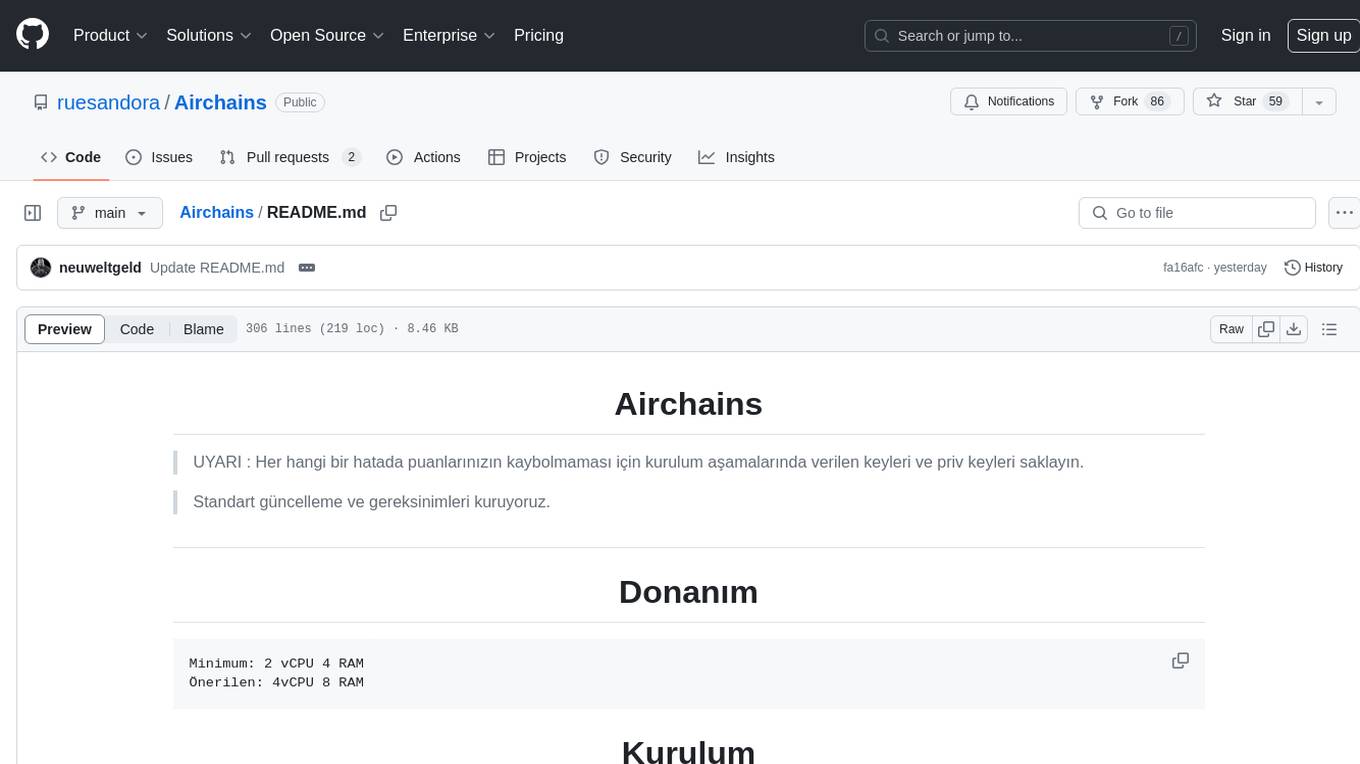
Airchains is a tool for setting up a local EVM network for testing and development purposes. It provides step-by-step instructions for installing and configuring the necessary components. The tool helps users create their own local EVM network, manage keys, deploy contracts, and interact with the network using RPC. It also guides users on setting up a station for tracking and managing transactions. Airchains is designed to facilitate testing and development activities related to blockchain applications built on the EVM platform.
README:
UYARI : Her hangi bir hatada puanlarınızın kaybolmaması için kurulum aşamalarında verilen keyleri ve priv keyleri saklayın.
Standart güncelleme ve gereksinimleri kuruyoruz.
Minimum: 2 vCPU 4 RAM
Önerilen: 4vCPU 8 RAM
# güncelleme
apt update && apt upgrade -y
sudo apt install -y curl git jq lz4 build-essential cmake perl automake autoconf libtool wget libssl-dev
# Go kurulumu
sudo rm -rf /usr/local/go
curl -L https://go.dev/dl/go1.22.3.linux-amd64.tar.gz | sudo tar -xzf - -C /usr/local
echo 'export PATH=$PATH:/usr/local/go/bin:$HOME/go/bin' >> $HOME/.bash_profile
source .bash_profile# Gerekli repoları çekiyoruz
git clone https://github.com/airchains-network/evm-station.git
git clone https://github.com/airchains-network/tracks.git# evmos ağımızın kurulumuna başlıyoruz, bu localde çalışan kendi ağımız.
cd evm-station
go mod tidy# Bu komutla kurulumu tamamlıyoruz.
/bin/bash ./scripts/local-setup.shSistem dosyasının sağlıklı çalışabilmesi için bir env oluşturuyoruz.
nano ~/.rollup-envİçerisine gerekli değişkenleri giriyoruz ardından ctrl+x, y ve enter tuşlarına basarak çıkıyoruz.
# buradaki kod bloğunda değiştirmeniz bir yer yok.
MONIKER="localtestnet"
KEYRING="test"
KEYALGO="eth_secp256k1"
LOGLEVEL="info"
HOMEDIR="$HOME/.evmosd"
TRACE=""
BASEFEE=1000000000
CONFIG=$HOMEDIR/config/config.toml
APP_TOML=$HOMEDIR/config/app.toml
GENESIS=$HOMEDIR/config/genesis.json
TMP_GENESIS=$HOMEDIR/config/tmp_genesis.json
VAL_KEY="mykey"Servis dosyasını yazıyoruz. User kullanıyorsanız
rootkısmını ona göre değiştirin.
# tek komut tüm bloğu copy paste yapabilirsiniz yavrularım
sudo tee /etc/systemd/system/rolld.service > /dev/null << EOF
[Unit]
Description=ZK
After=network.target
[Service]
User=root
EnvironmentFile=/root/.rollup-env
ExecStart=/root/evm-station/build/station-evm start --metrics "" --log_level info --json-rpc.api eth,txpool,personal,net,debug,web3 --chain-id "stationevm_1234-1"
Restart=always
RestartSec=3
[Install]
WantedBy=multi-user.target
EOFServisleri güncelleyip başlatıyoruz.
sudo systemctl daemon-reload
sudo systemctl enable rolld
sudo systemctl start rolld
sudo journalctl -u rolld -f --no-hostname -o cat
Logların aktığını görmelisiniz, ardından ctrl+c ile logları durduruyoruz.
Sonraki aşamalarda rpc lazım olacak, onun ayarını yapalım. Önce çalışan nodu durduralım
systemctl stop rolld
Sonra app.toml dosyasına gidelim. En altta RPC kısmı şu şekilde olacak.
nano ~/.evmosd/config/app.toml
Ayarı yaptıktan sonra ctrl+x, y ve enter ile kaydedip çıkalım ve nodu tekrar başlatalım.
systemctl restart rolld
Böylece cosmos rpclerini public yapmayı öğrendiniz.
Bu komut bize private key verecek, saklıyoruz.
/bin/bash ./scripts/local-keys.shDA layer olarak eigenlayer kullanacağız. Bunun için key gerekiyor, binary indirip çalışması için izin veriyoruz. Resmi dökümanda celestia, avail kurulumları da var onlara da bakabilirsiniz. Mock, yani sahte DA da kullanabilirsiniz (mock ile bir süre puan kazanılmasına izin vereceklermiş) Şu an testnette sonradan DA değiştirilmiyor, güncellemeyle bunu mümkün kılacaklarını söylediler.
Benim EigenDA seçme nedenim en kolay Celestia ve Eigen olması (token de bulması kolay), Celestia ezbere biliyoruz - bu sefer Eigen olsun.
cd $HOME
wget https://github.com/airchains-network/tracks/releases/download/v0.0.2/eigenlayer
mkdir -p $HOME/go/bin
chmod +x $HOME/eigenlayer
mv $HOME/eigenlayer $HOME/go/bin# `CUZDANADI` değiştirin ve çıktıda size verilen ECDSA Private Keyi saklayın.
# Ctrl+c ile kapatın enterlayın ve verilen diğer `public hex` kenara not edin lazım olacak.
# Verilen 0x evm adresine her ihtimale karşı 0.5 eth atın holesky ağında.
eigenlayer operator keys create --key-type ecdsa CUZDANADIŞimdi track ve station kısmına geçiyoruz.
cd $HOME
cd tracks
go mod tidytracks klasörü içindeyken aşağıdaki kodu başlatıyoruz.
PUBLICHEXbiraz önce aldığımız public key olacak.
MONIKER (validatör ismi) değiştirebilirsiniz kafanıza göre.
go run cmd/main.go init --daRpc "disperser-holesky.eigenda.xyz" --daKey "PUBLICHEX" --daType "eigen" --moniker "MONIKER" --stationRpc "http://127.0.0.1:8545" --stationAPI "http://127.0.0.1:8545" --stationType "evm"Çıktı şu şekilde olacak
Şimdi tracker adresi oluşturuyoruz.
TRACKERCUZDANdeğiştirin.
Çıktıyı yedek alın, air prefixli cüzdanla discordda
switchyard faucetkanalından token alın.
go run cmd/main.go keys junction --accountName TRACKERCUZDAN --accountPath $HOME/.tracks/junction-accounts/keysSonra proveri çalıştırıyoruz.
go run cmd/main.go prover v1EVMŞimdi bize node id lazım, bunu da şurdan alıyoruz.
# ctrl w ile node id aratabilirsiniz, en aşağı gidip biraz yukarıda
nano ~/.tracks/config/sequencer.tomlAşağıdaki kodda
TRACKERCUZDANyukarda yazdığınız adı
TRACKERCUZDAN-ADRESIbuna da air cüzdanı
IPip adresiniz
NODEIDsequencer.toml dan temin ettiğimiz node id olacak
go run cmd/main.go create-station --accountName TRACKERCUZDAN --accountPath $HOME/.tracks/junction-accounts/keys --jsonRPC "https://junction-testnet-rpc.synergynodes.com/" --info "EVM Track" --tracks TRACKERCUZDAN-ADRESI --bootstrapNode "/ip4/IP/tcp/2300/p2p/NODEID"Stationu kurduk, şimdi bunu servisle çalıştıralım.
Servis çalıştırmak istemeyenler screen açıp tracks klasöründe
go run cmd/main.go startkomutunu çalıştırabilirler.
sudo tee /etc/systemd/system/stationd.service > /dev/null << EOF
[Unit]
Description=station track service
After=network-online.target
[Service]
User=root
WorkingDirectory=/root/tracks/
ExecStart=/usr/local/go/bin/go run cmd/main.go start
Restart=always
RestartSec=3
LimitNOFILE=65535
[Install]
WantedBy=multi-user.target
EOFscreen -S air
sudo systemctl daemon-reload
sudo systemctl enable stationd
sudo systemctl restart stationd
sudo journalctl -u stationd -f --no-hostname -o catKurulum işlemleri bu kadar. Ama şu an puan kazanmıyorsunuz. Tracker cüzdanınızın mnemoniclerini leap wallet import edip https://points.airchains.io/ connect diyoruz Dashboardda stationu ve puanınızı görebilirsiniz. Henüz tx yapmadığımız için 100 point pending görünecek. Bunun sebebi şu, puan kazanmanız için pod çıkarmanız lazım. Pod 25txten oluşan bir paket gibi düşünebilirsiniz. Her 25tx 1 pod çıkaracak ve bu işlemlerden 5 puan kazanacaksınız. İlk kurulumdaki 100 puan, ilk poddan sonra aktif olacak.
Bunun için de şunu yapıyoruz
İlk başta bin/bash ./scripts/local-keys.sh komutuyla bir priv key aldık ve rpc ayarı yapmıştık.
Metamaska bu priv keyi import ediyoruz, ağ ekle kısmında da şu bilgileri girin.
rpc http://IP:8545
id 1234
ticker tEVMOS
girip okeyliyoruz.
Ayrıca rpc'ye bağlanabilmek için 8545 numaralı portu açıyoruz o da şu komutla
sudo ufw allow 8545
Buradan artık kontrat mı deploy edersiniz, manuel tx mi kasarsınız size kalmış.
Track işleminde rpc hatası alanlar rollback yapmayı denesinler. Bazen 1 bazen 3 rollback işlemiyle sorun çözülüyor.
Kaç kez rollback yapmak istiyorsanız go run cmd/main.go rollback komutunu o kadar çalıştırın, her seferinde çıktıyı bekleyin.
systemctl stop stationd
cd tracks
go run cmd/main.go rollback
sudo systemctl restart stationd
sudo journalctl -u stationd -f --no-hostname -o cat
Hadi sağlıcakla.
For Tasks:
Click tags to check more tools for each tasksFor Jobs:
Alternative AI tools for Airchains
Similar Open Source Tools

Airchains
Airchains is a tool for setting up a local EVM network for testing and development purposes. It provides step-by-step instructions for installing and configuring the necessary components. The tool helps users create their own local EVM network, manage keys, deploy contracts, and interact with the network using RPC. It also guides users on setting up a station for tracking and managing transactions. Airchains is designed to facilitate testing and development activities related to blockchain applications built on the EVM platform.
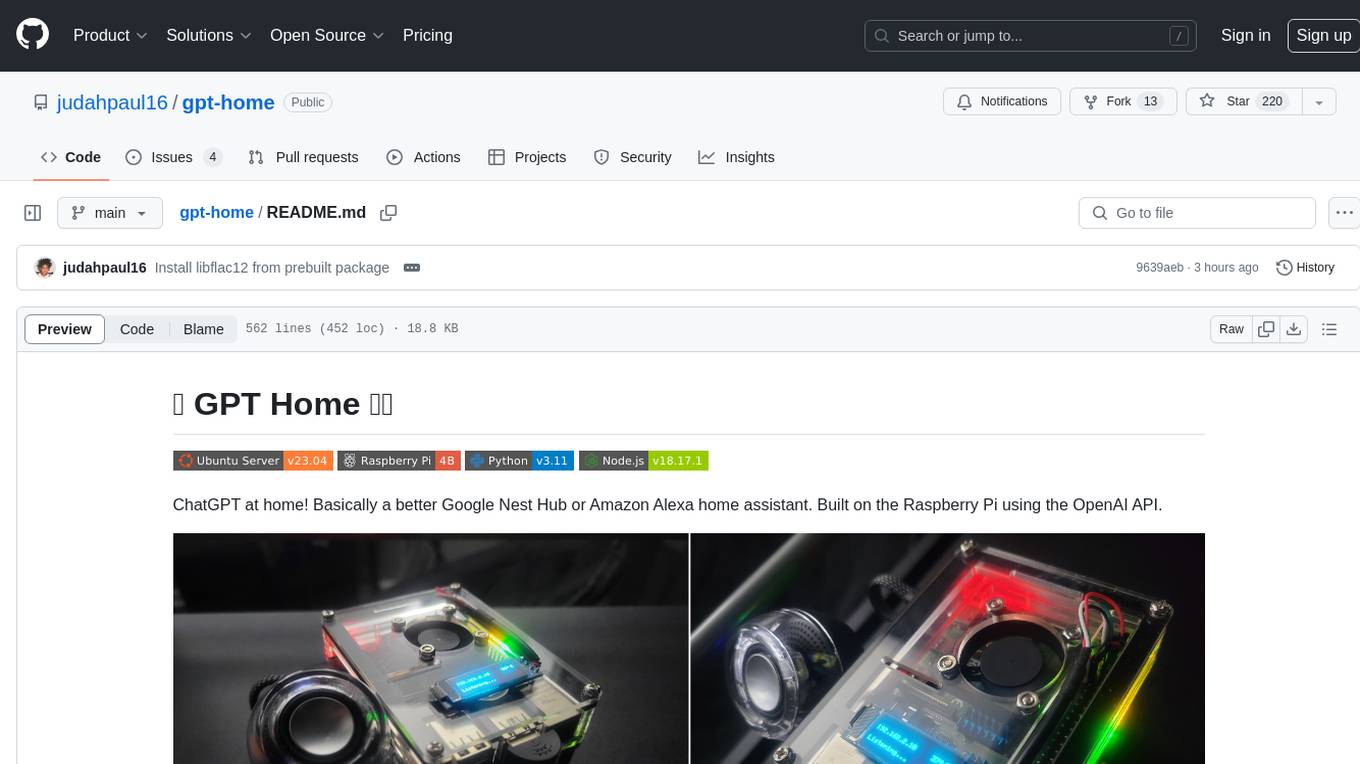
gpt-home
GPT Home is a project that allows users to build their own home assistant using Raspberry Pi and OpenAI API. It serves as a guide for setting up a smart home assistant similar to Google Nest Hub or Amazon Alexa. The project integrates various components like OpenAI, Spotify, Philips Hue, and OpenWeatherMap to provide a personalized home assistant experience. Users can follow the detailed instructions provided to build their own version of the home assistant on Raspberry Pi, with optional components for customization. The project also includes system configurations, dependencies installation, and setup scripts for easy deployment. Overall, GPT Home offers a DIY solution for creating a smart home assistant using Raspberry Pi and OpenAI technology.
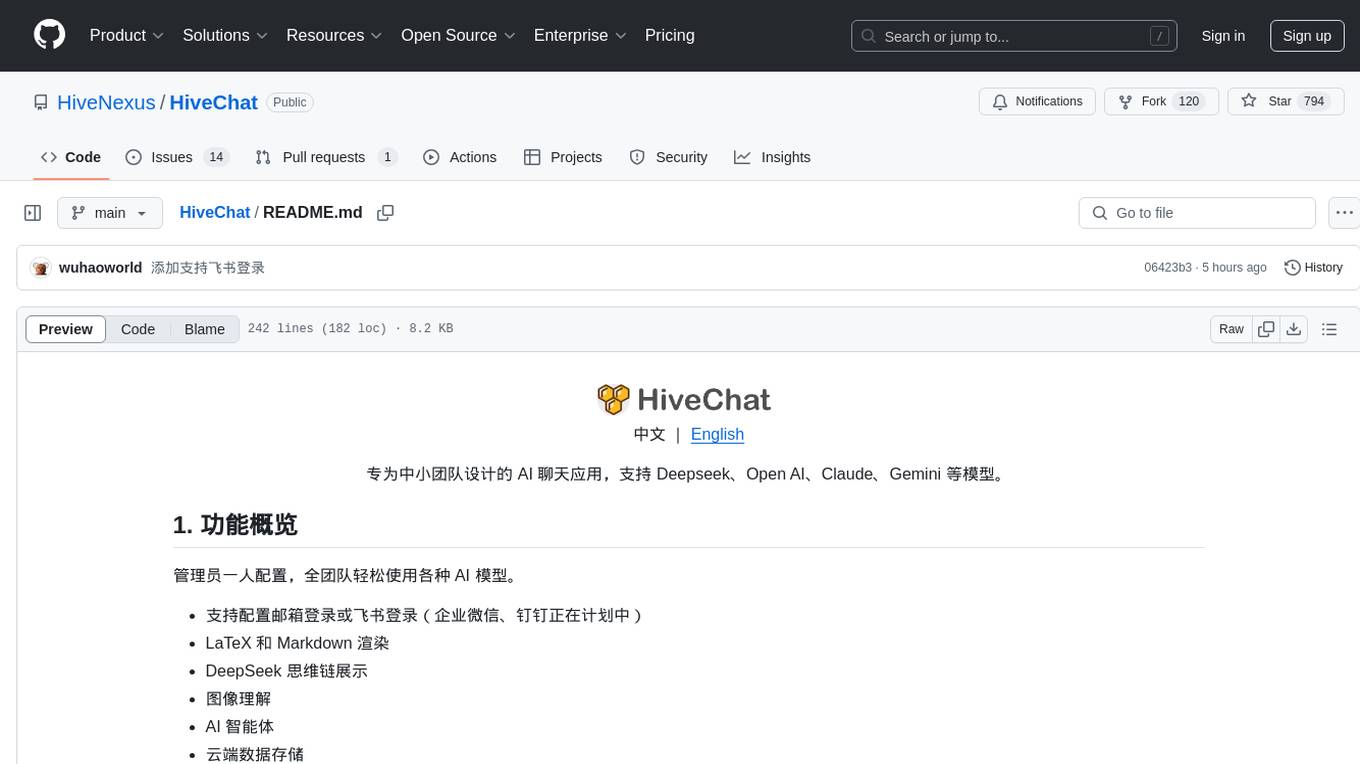
HiveChat
HiveChat is an AI chat application designed for small and medium teams. It supports various models such as DeepSeek, Open AI, Claude, and Gemini. The tool allows easy configuration by one administrator for the entire team to use different AI models. It supports features like email or Feishu login, LaTeX and Markdown rendering, DeepSeek mind map display, image understanding, AI agents, cloud data storage, and integration with multiple large model service providers. Users can engage in conversations by logging in, while administrators can configure AI service providers, manage users, and control account registration. The technology stack includes Next.js, Tailwindcss, Auth.js, PostgreSQL, Drizzle ORM, and Ant Design.
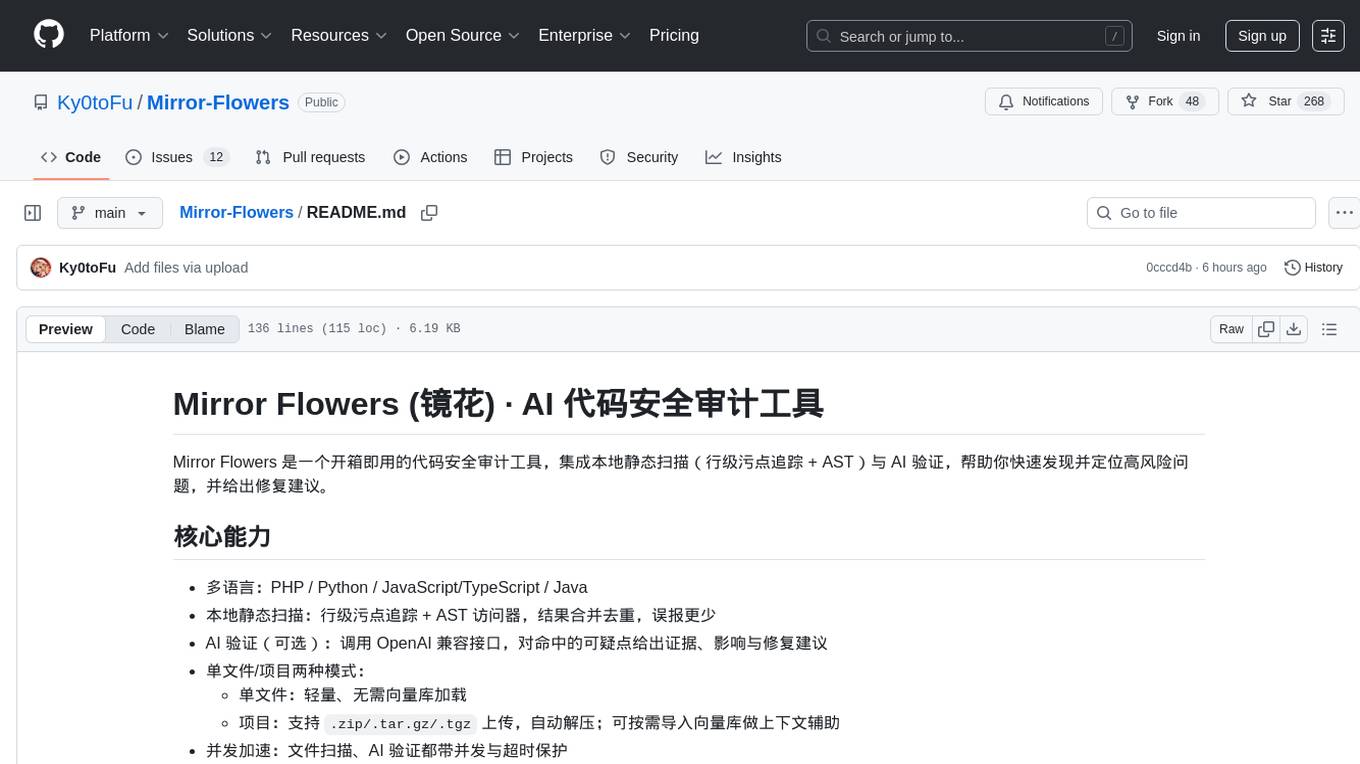
Mirror-Flowers
Mirror Flowers is an out-of-the-box code security auditing tool that integrates local static scanning (line-level taint tracking + AST) with AI verification to help quickly discover and locate high-risk issues, providing repair suggestions. It supports multiple languages such as PHP, Python, JavaScript/TypeScript, and Java. The tool offers both single-file and project modes, with features like concurrent acceleration, integrated UI for visual results, and compatibility with multiple OpenAI interface providers. Users can configure the tool through environment variables or API, and can utilize it through a web UI or HTTP API for tasks like single-file auditing or project auditing.
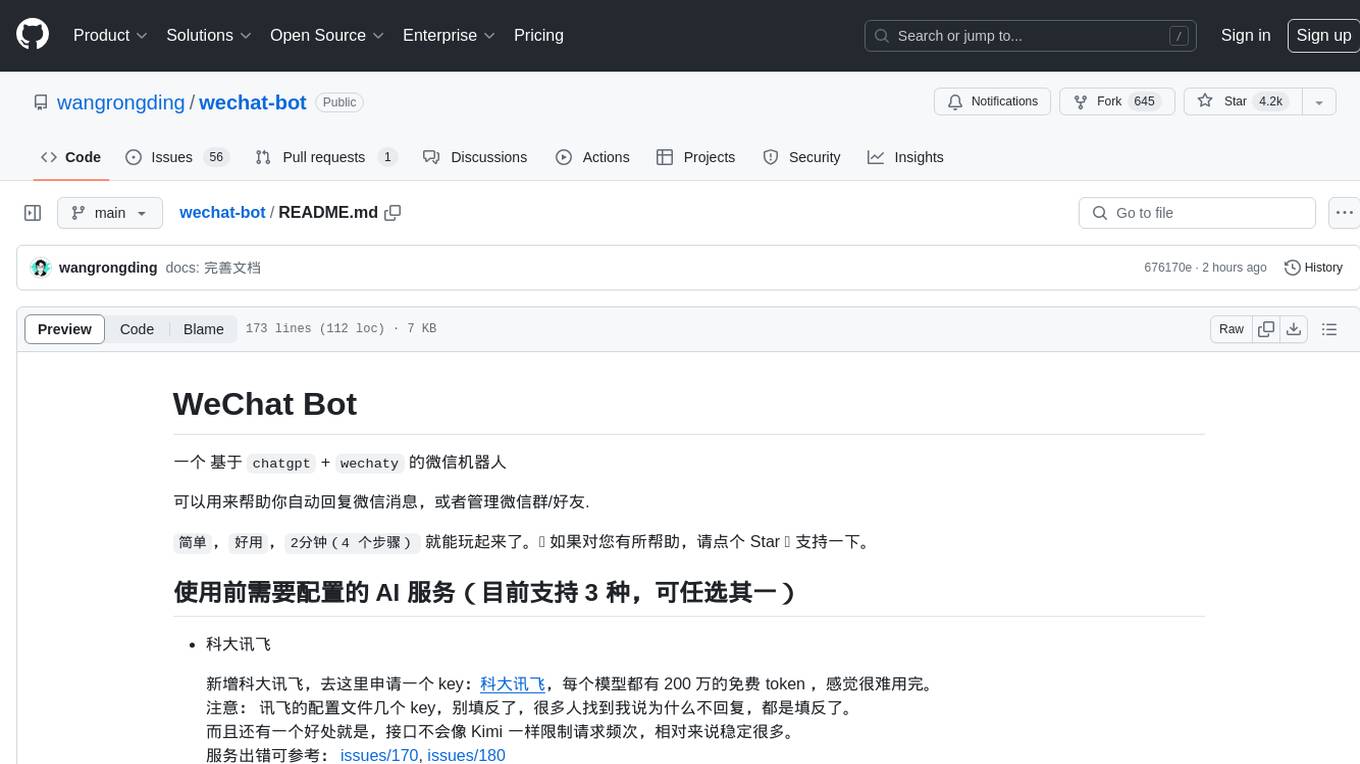
wechat-bot
WeChat Bot is a simple and easy-to-use WeChat robot based on chatgpt and wechaty. It can help you automatically reply to WeChat messages or manage WeChat groups/friends. The tool requires configuration of AI services such as Xunfei, Kimi, or ChatGPT. Users can customize the tool to automatically reply to group or private chat messages based on predefined conditions. The tool supports running in Docker for easy deployment and provides a convenient way to interact with various AI services for WeChat automation.
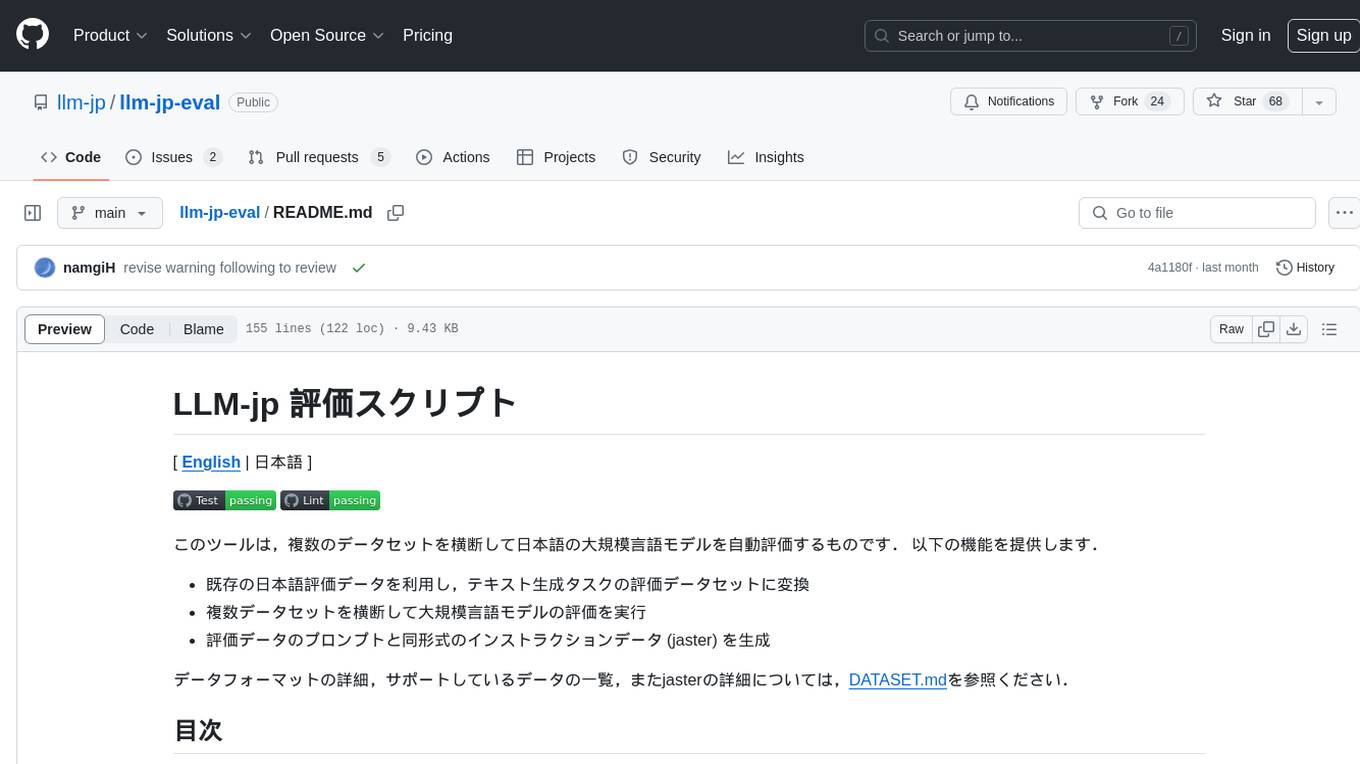
llm-jp-eval
LLM-jp-eval is a tool designed to automatically evaluate Japanese large language models across multiple datasets. It provides functionalities such as converting existing Japanese evaluation data to text generation task evaluation datasets, executing evaluations of large language models across multiple datasets, and generating instruction data (jaster) in the format of evaluation data prompts. Users can manage the evaluation settings through a config file and use Hydra to load them. The tool supports saving evaluation results and logs using wandb. Users can add new evaluation datasets by following specific steps and guidelines provided in the tool's documentation. It is important to note that using jaster for instruction tuning can lead to artificially high evaluation scores, so caution is advised when interpreting the results.
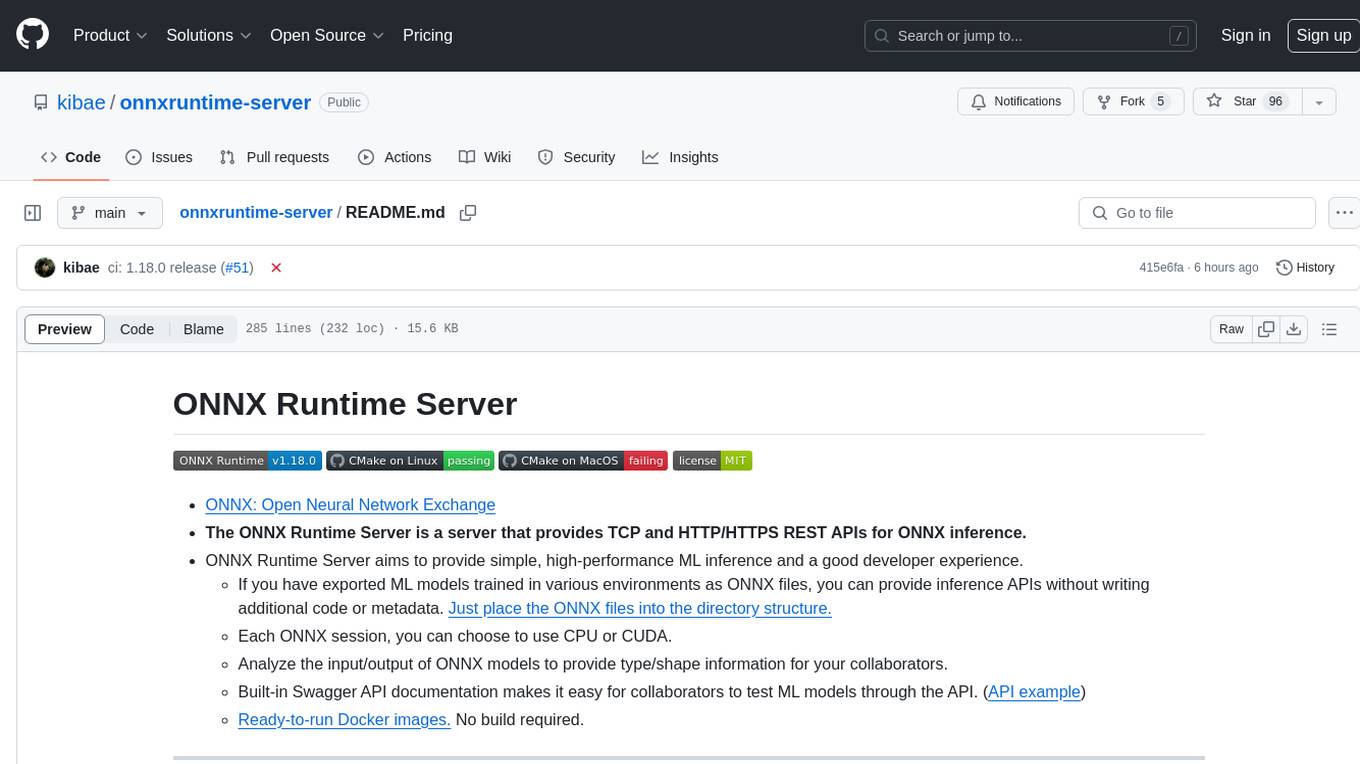
onnxruntime-server
ONNX Runtime Server is a server that provides TCP and HTTP/HTTPS REST APIs for ONNX inference. It aims to offer simple, high-performance ML inference and a good developer experience. Users can provide inference APIs for ONNX models without writing additional code by placing the models in the directory structure. Each session can choose between CPU or CUDA, analyze input/output, and provide Swagger API documentation for easy testing. Ready-to-run Docker images are available, making it convenient to deploy the server.
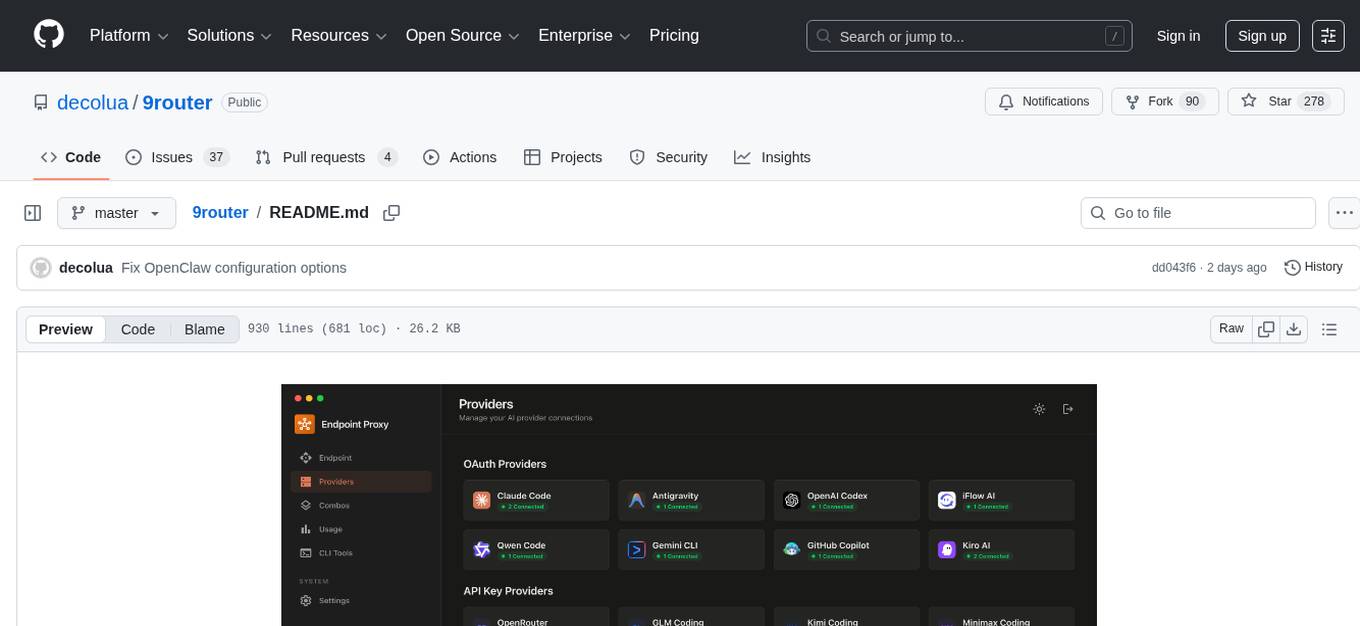
9router
9Router is a free AI router tool designed to help developers maximize their AI subscriptions, auto-route to free and cheap AI models with smart fallback, and avoid hitting limits and wasting money. It offers features like real-time quota tracking, format translation between OpenAI, Claude, and Gemini, multi-account support, auto token refresh, custom model combinations, request logging, cloud sync, usage analytics, and flexible deployment options. The tool supports various providers like Claude Code, Codex, Gemini CLI, GitHub Copilot, GLM, MiniMax, iFlow, Qwen, and Kiro, and allows users to create combos for different scenarios. Users can connect to the tool via CLI tools like Cursor, Claude Code, Codex, OpenClaw, and Cline, and deploy it on VPS, Docker, or Cloudflare Workers.
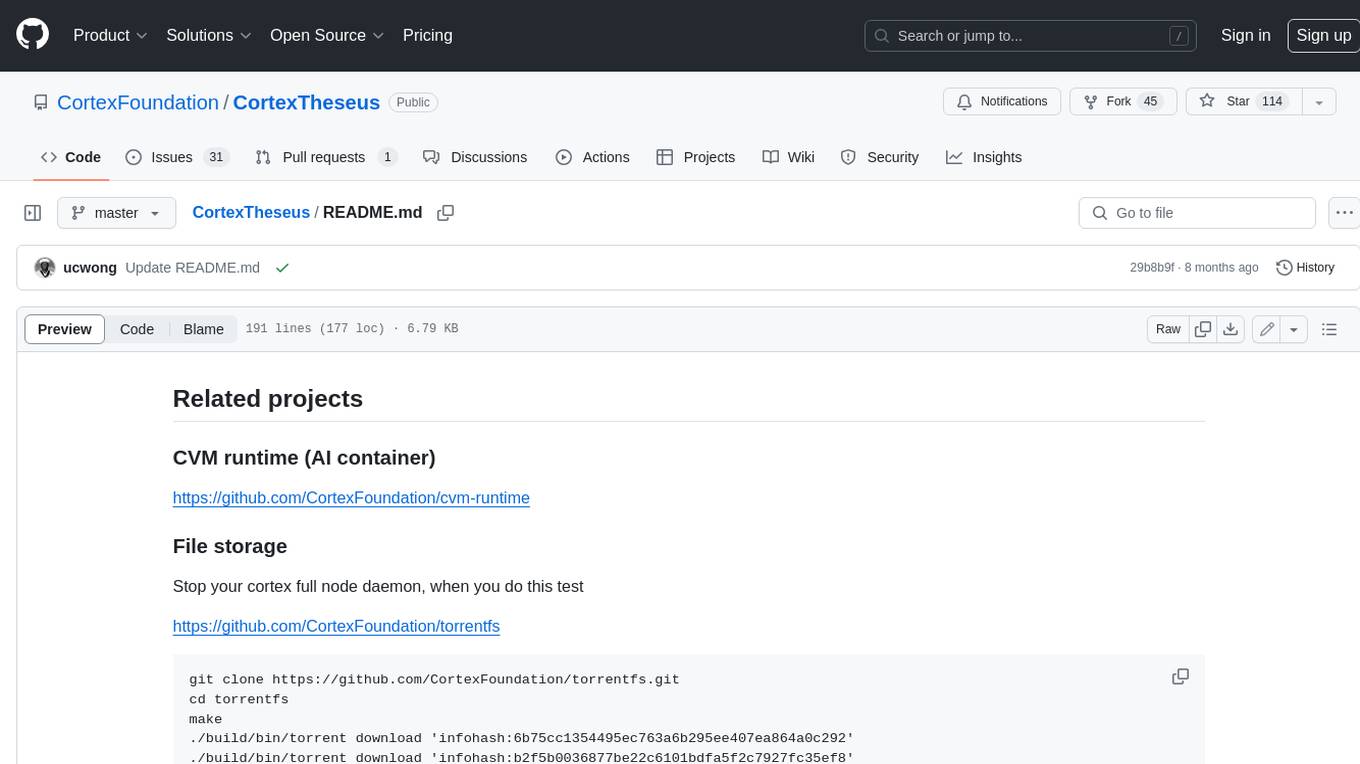
CortexTheseus
CortexTheseus is a full node implementation of the Cortex blockchain, written in C++. It provides a complete set of features for interacting with the Cortex network, including the ability to create and manage accounts, send and receive transactions, and participate in consensus. CortexTheseus is designed to be scalable, secure, and easy to use, making it an ideal choice for developers building applications on the Cortex blockchain.
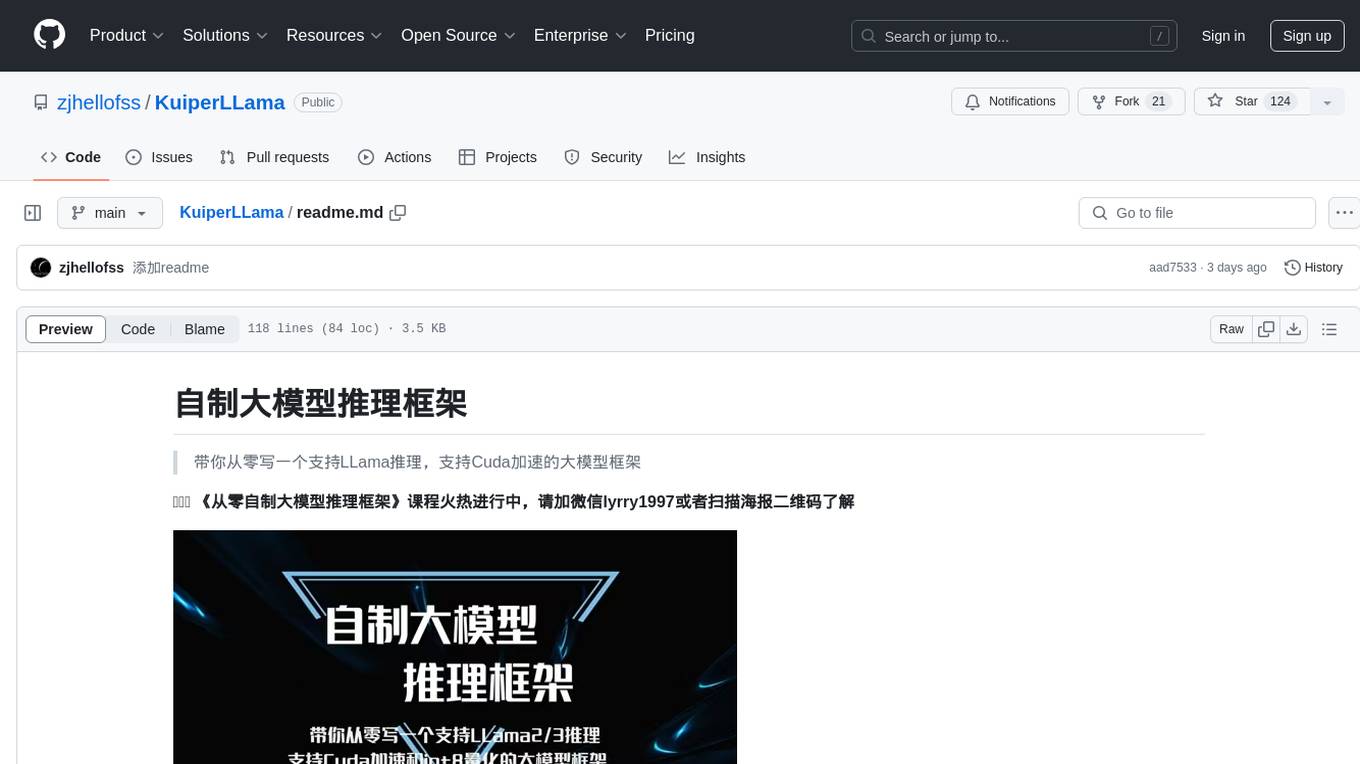
KuiperLLama
KuiperLLama is a custom large model inference framework that guides users in building a LLama-supported inference framework with Cuda acceleration from scratch. The framework includes modules for architecture design, LLama2 model support, model quantization, Cuda basics, operator implementation, and fun tasks like text generation and storytelling. It also covers learning other commercial inference frameworks for comprehensive understanding. The project provides detailed tutorials and resources for developing and optimizing large models for efficient inference.
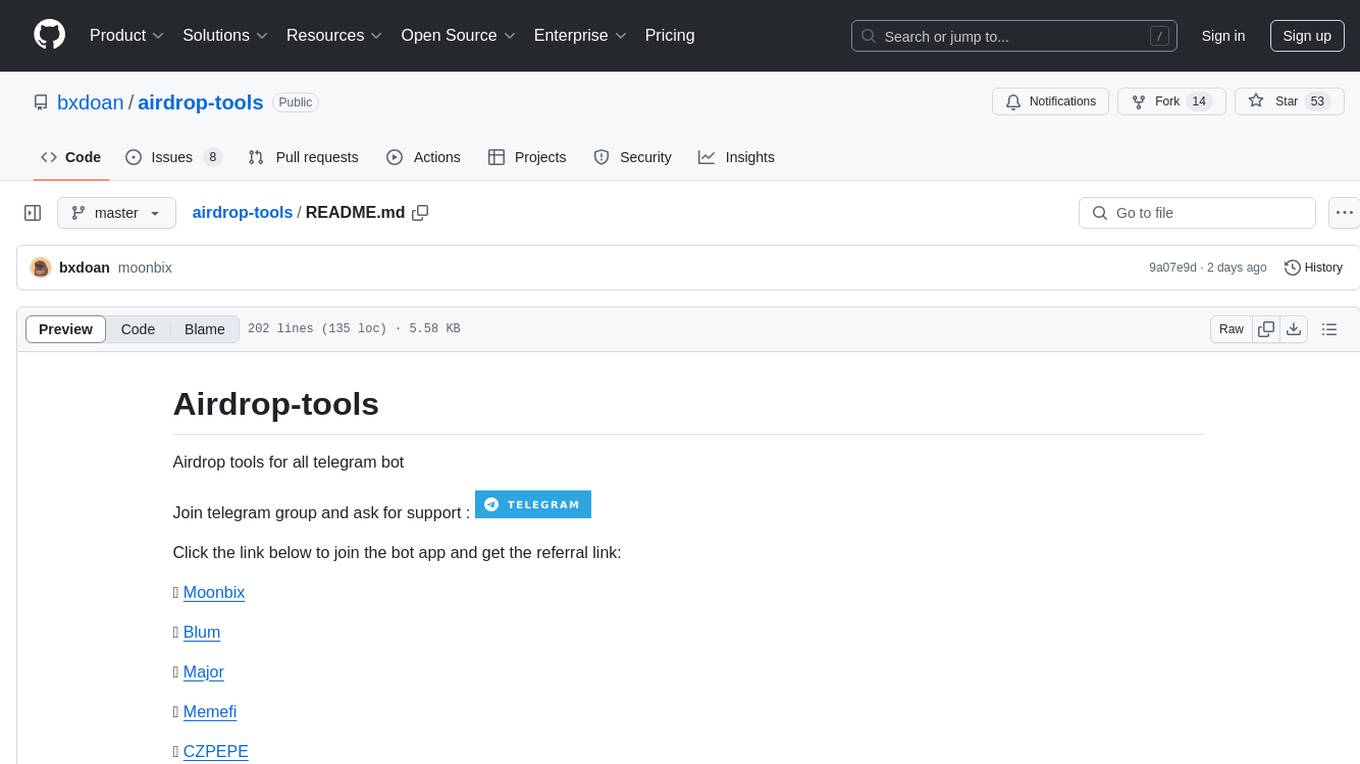
airdrop-tools
Airdrop-tools is a repository containing tools for all Telegram bots. Users can join the Telegram group for support and access various bot apps like Moonbix, Blum, Major, Memefi, and more. The setup requires Node.js and Python, with instructions on creating data directories and installing extensions. Users can run different tools like Blum, Major, Moonbix, Yescoin, Matchain, Fintopio, Agent301, IAMDOG, Banana, Cats, Wonton, and Xkucoin by following specific commands. The repository also provides contact information and options for supporting the creator.
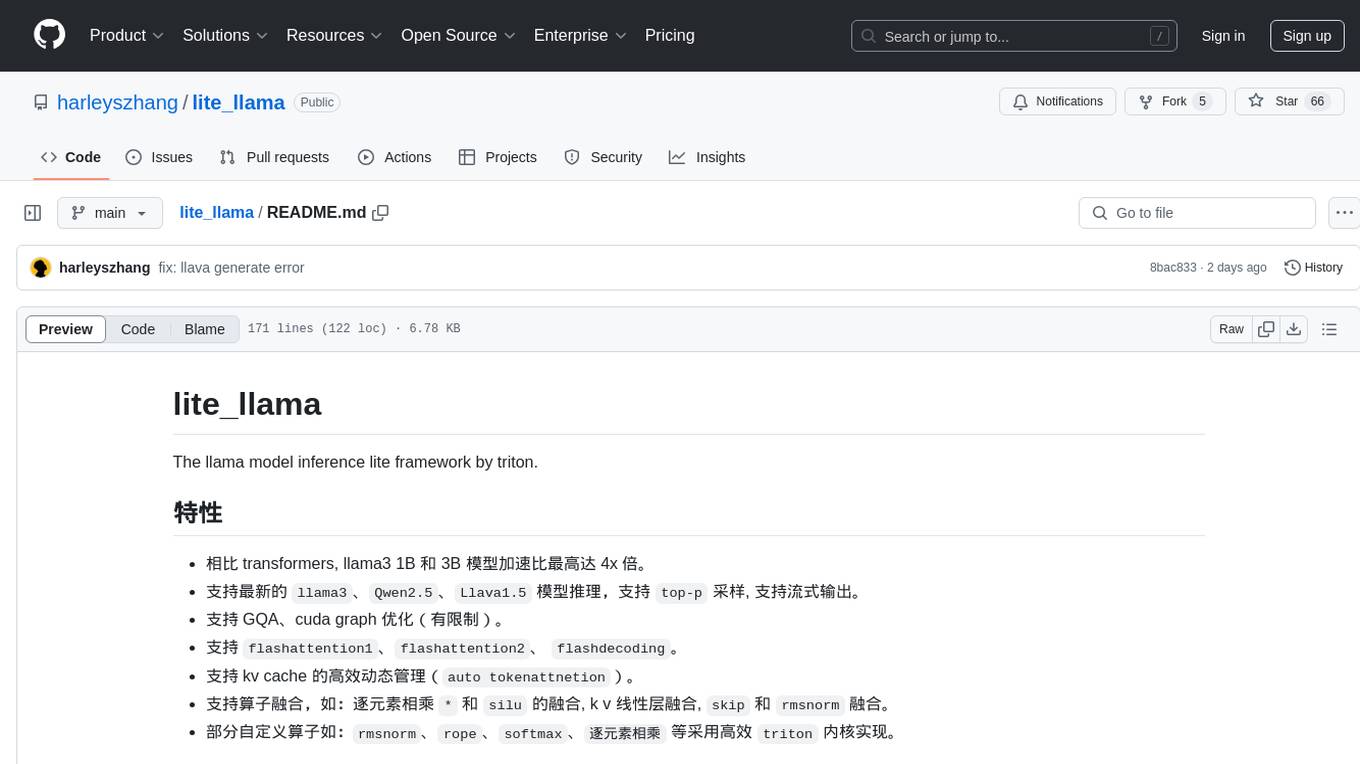
lite_llama
lite_llama is a llama model inference lite framework by triton. It offers accelerated inference for llama3, Qwen2.5, and Llava1.5 models with up to 4x speedup compared to transformers. The framework supports top-p sampling, stream output, GQA, and cuda graph optimizations. It also provides efficient dynamic management for kv cache, operator fusion, and custom operators like rmsnorm, rope, softmax, and element-wise multiplication using triton kernels.
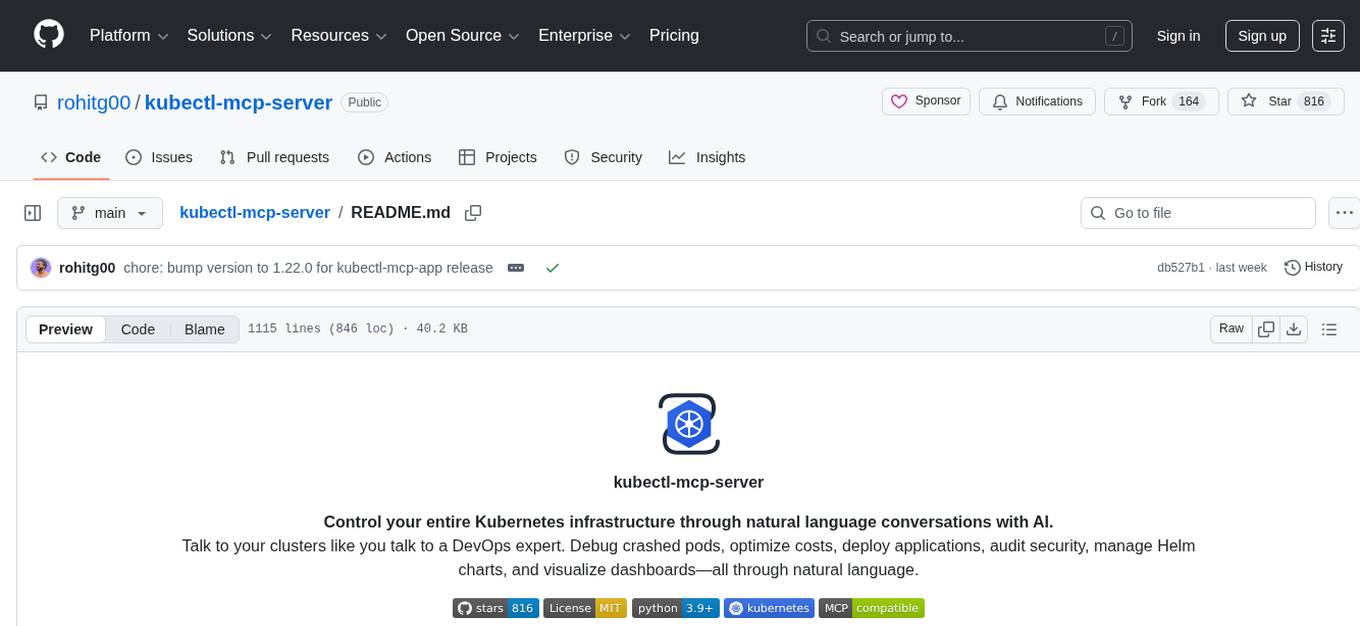
kubectl-mcp-server
Control your entire Kubernetes infrastructure through natural language conversations with AI. Talk to your clusters like you talk to a DevOps expert. Debug crashed pods, optimize costs, deploy applications, audit security, manage Helm charts, and visualize dashboards—all through natural language. The tool provides 253 powerful tools, 8 workflow prompts, 8 data resources, and works with all major AI assistants. It offers AI-powered diagnostics, built-in cost optimization, enterprise-ready features, zero learning curve, universal compatibility, visual insights, and production-grade deployment options. From debugging crashed pods to optimizing cluster costs, kubectl-mcp-server is your AI-powered DevOps companion.
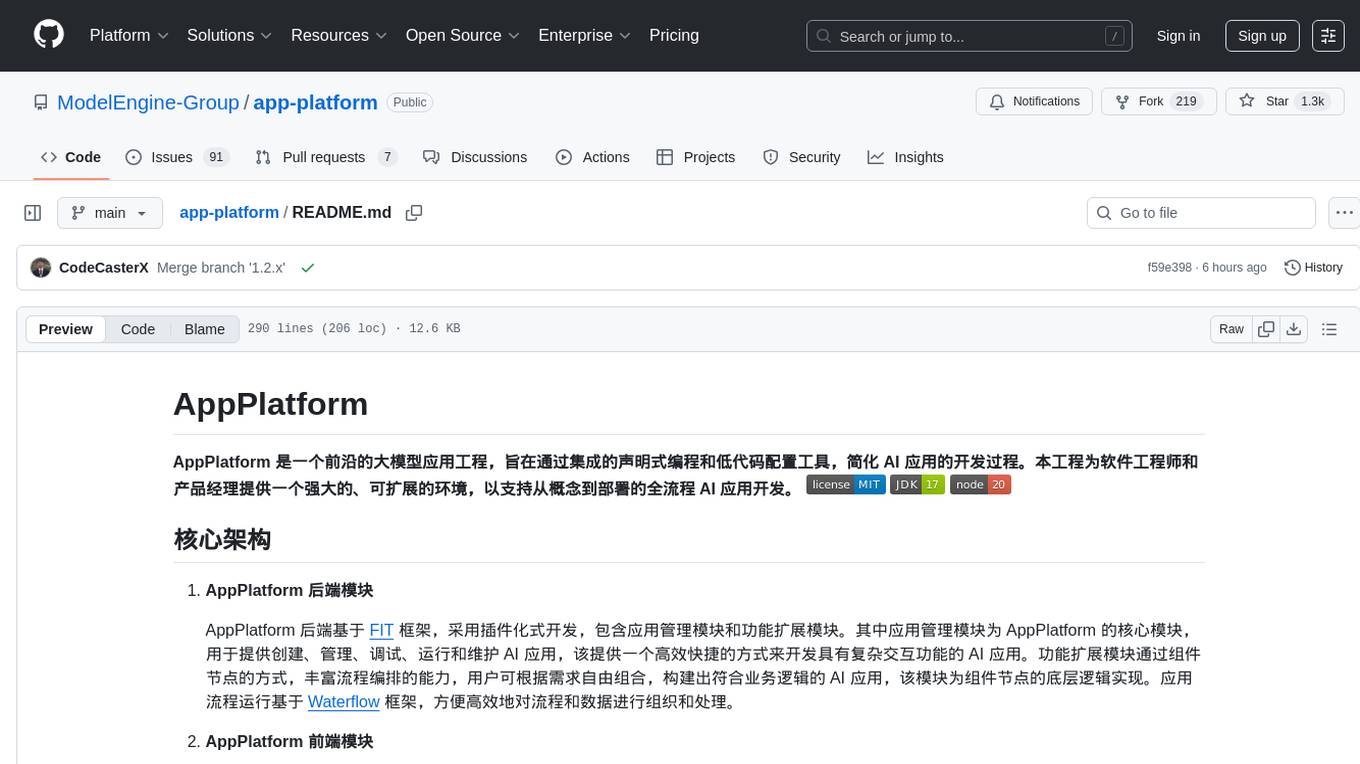
app-platform
AppPlatform is an advanced large-scale model application engineering aimed at simplifying the development process of AI applications through integrated declarative programming and low-code configuration tools. This project provides a powerful and scalable environment for software engineers and product managers to support the full-cycle development of AI applications from concept to deployment. The backend module is based on the FIT framework, utilizing a plugin-based development approach, including application management and feature extension modules. The frontend module is developed using React framework, focusing on core modules such as application development, application marketplace, intelligent forms, and plugin management. Key features include low-code graphical interface, powerful operators and scheduling platform, and sharing and collaboration capabilities. The project also provides detailed instructions for setting up and running both backend and frontend environments for development and testing.
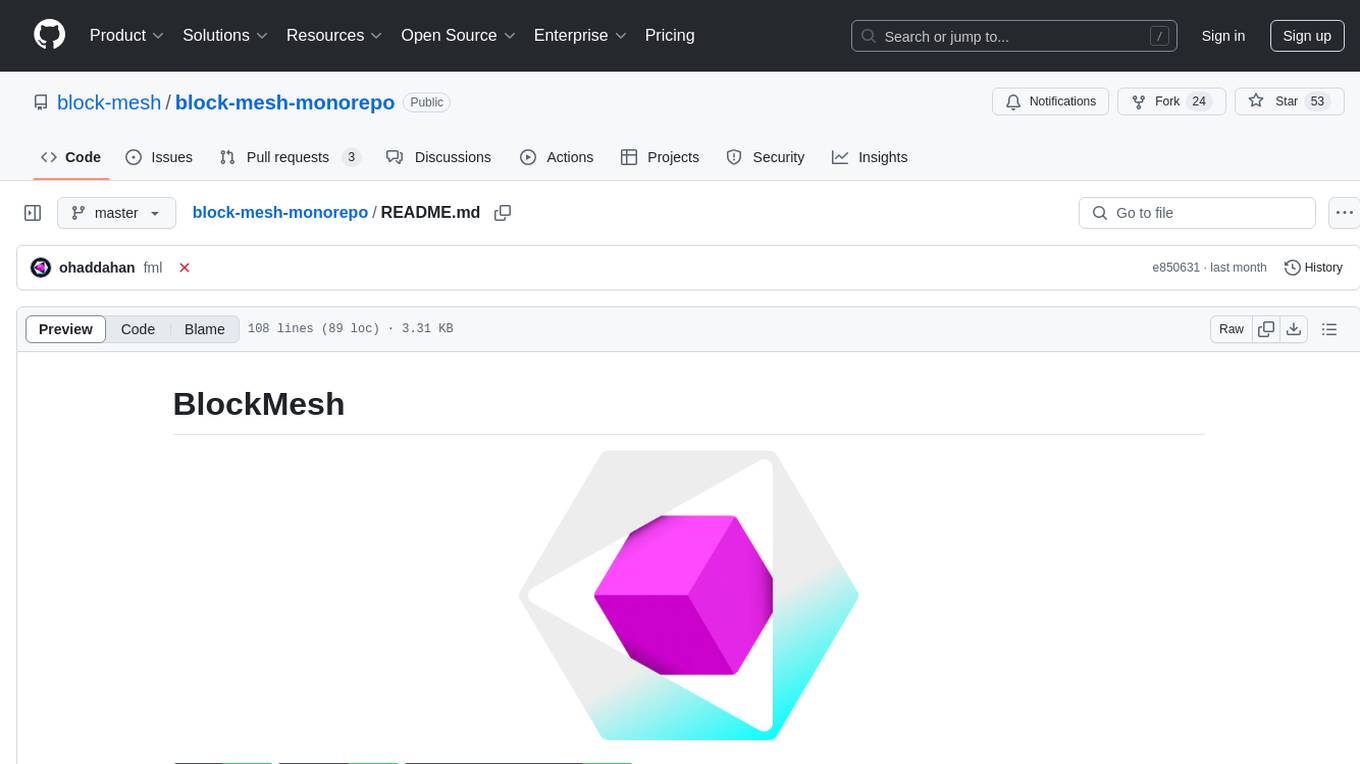
block-mesh-monorepo
BlockMesh is a monorepo containing various tools and scripts for managing a blockchain mesh network. It provides functionalities for setting up environment variables, installing necessary dependencies, running local scripts, and implementing Git hooks for pre-commit and pre-push actions. The repository includes tools for cargo, sqlx-cli, wasm-pack, bunyan, psql, and Docker, along with configurations for different APIs like Twitter and AWS.
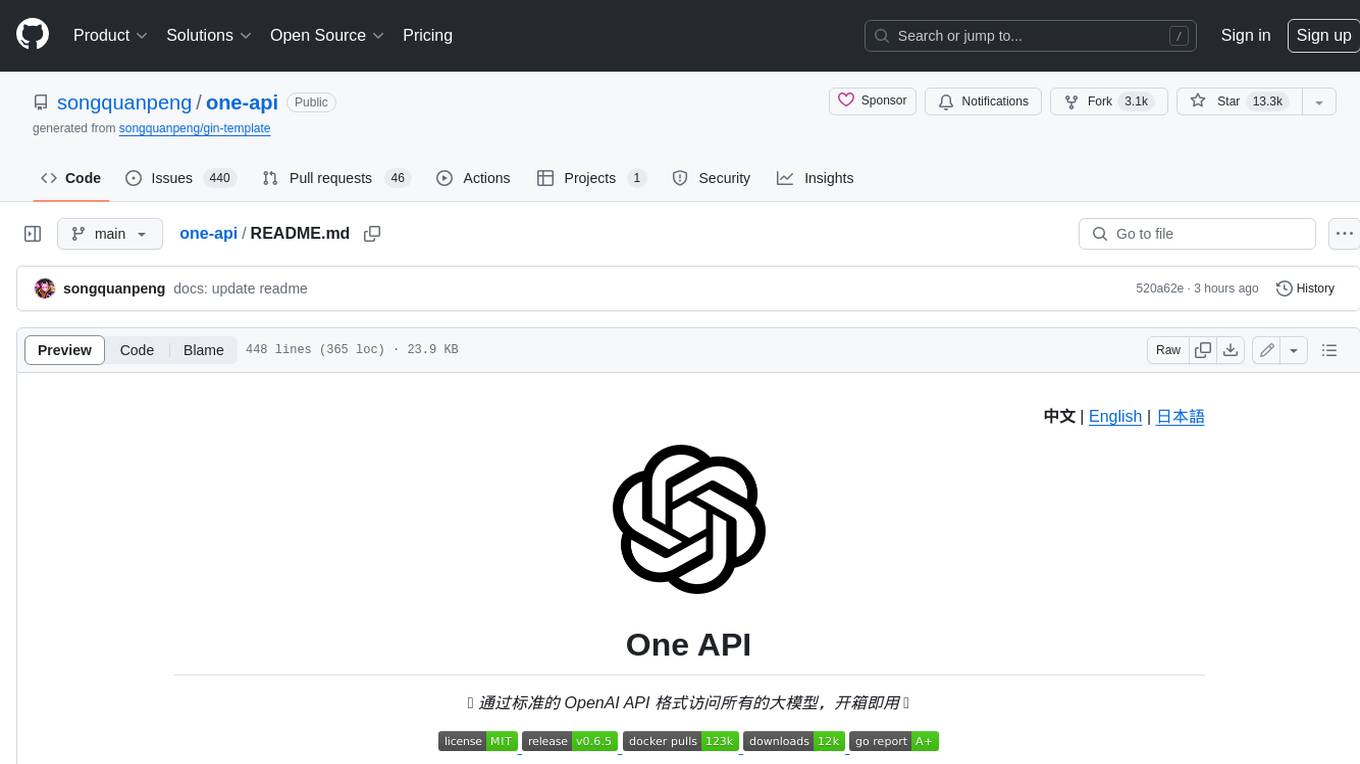
one-api
One API 是一个开源项目,它通过标准的 OpenAI API 格式访问所有的大模型,开箱即用。它支持多种大模型,包括 OpenAI ChatGPT 系列模型、Anthropic Claude 系列模型、Google PaLM2/Gemini 系列模型、Mistral 系列模型、百度文心一言系列模型、阿里通义千问系列模型、讯飞星火认知大模型、智谱 ChatGLM 系列模型、360 智脑、腾讯混元大模型、Moonshot AI、百川大模型、MINIMAX、Groq、Ollama、零一万物、阶跃星辰。One API 还支持配置镜像以及众多第三方代理服务,支持通过负载均衡的方式访问多个渠道,支持 stream 模式,支持多机部署,支持令牌管理,支持兑换码管理,支持渠道管理,支持用户分组以及渠道分组,支持渠道设置模型列表,支持查看额度明细,支持用户邀请奖励,支持以美元为单位显示额度,支持发布公告,设置充值链接,设置新用户初始额度,支持模型映射,支持失败自动重试,支持绘图接口,支持 Cloudflare AI Gateway,支持丰富的自定义设置,支持通过系统访问令牌调用管理 API,进而**在无需二开的情况下扩展和自定义** One API 的功能,支持 Cloudflare Turnstile 用户校验,支持用户管理,支持多种用户登录注册方式,支持主题切换,配合 Message Pusher 可将报警信息推送到多种 App 上。
For similar tasks
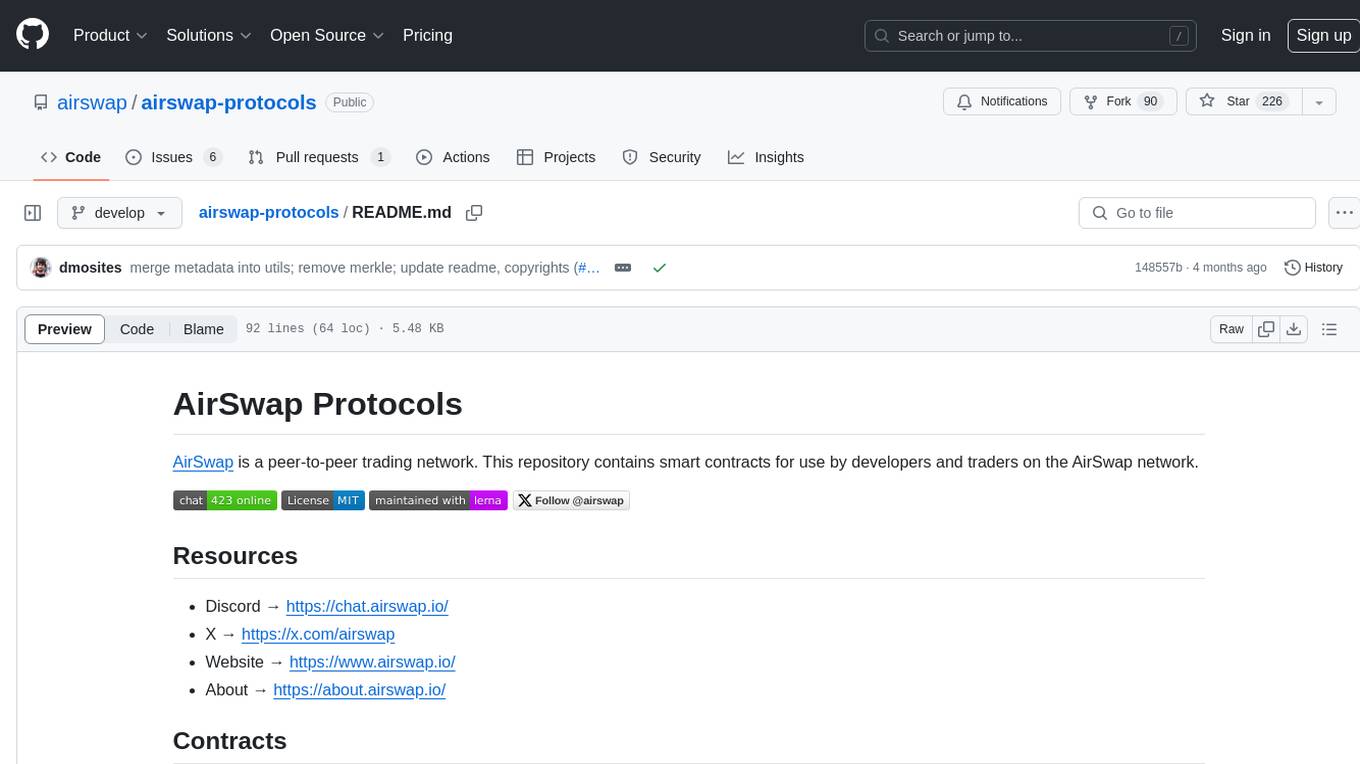
airswap-protocols
AirSwap Protocols is a repository containing smart contracts for developers and traders on the AirSwap peer-to-peer trading network. It includes various packages for functionalities like server registry, atomic token swap, staking, rewards pool, batch token and order calls, libraries, and utils. The repository follows a branching and release process for contracts and tools, with steps for regular development process and individual package features or patches. Users can deploy and verify contracts using specific commands with network flags.

Airchains
Airchains is a tool for setting up a local EVM network for testing and development purposes. It provides step-by-step instructions for installing and configuring the necessary components. The tool helps users create their own local EVM network, manage keys, deploy contracts, and interact with the network using RPC. It also guides users on setting up a station for tracking and managing transactions. Airchains is designed to facilitate testing and development activities related to blockchain applications built on the EVM platform.
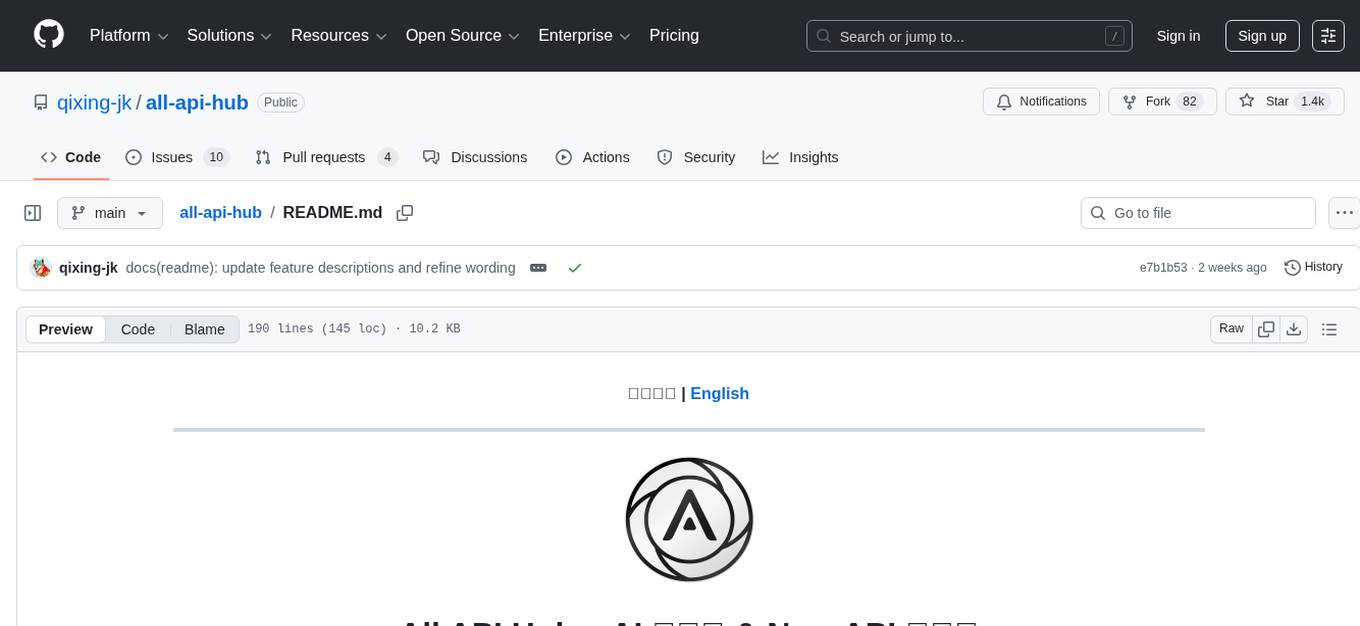
all-api-hub
All API Hub is an open-source browser extension that serves as a centralized management tool for third-party AI aggregation hubs and self-built New APIs. It automatically identifies accounts, checks balances, synchronizes models, manages keys, and supports cross-platform and cloud backups. The extension supports various aggregation hubs like one-api, new-api, Veloera, one-hub, done-hub, Neo-API, Super-API, RIX_API, and VoAPI. It offers features such as intelligent site recognition, multi-account overview panel, automatic check-ins, token and key management, model information and pricing display, model and interface validation, usage analysis and visualization, quick export integration, self-built New API and Veloera management tools, Cloudflare challenge assistant, data backup and synchronization, multi-platform support, and privacy-focused local storage.
For similar jobs
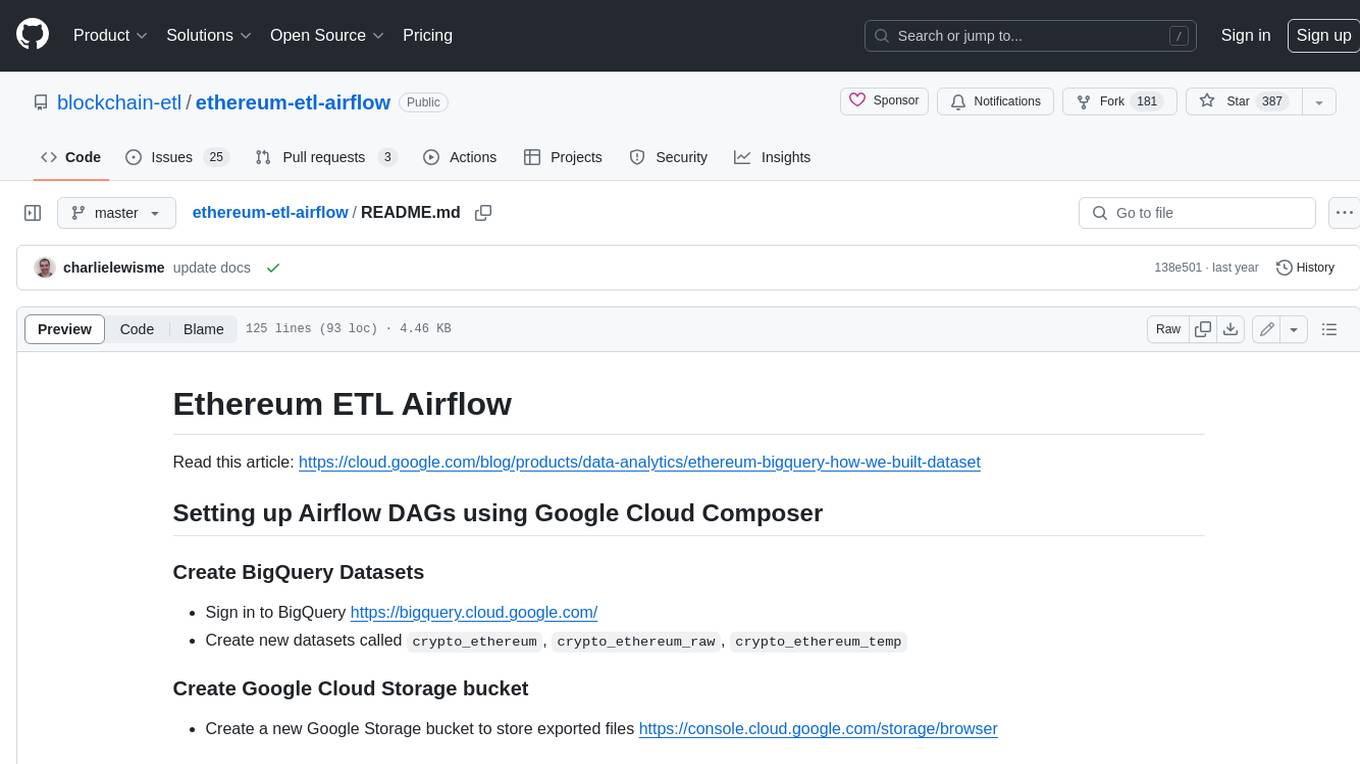
ethereum-etl-airflow
This repository contains Airflow DAGs for extracting, transforming, and loading (ETL) data from the Ethereum blockchain into BigQuery. The DAGs use the Google Cloud Platform (GCP) services, including BigQuery, Cloud Storage, and Cloud Composer, to automate the ETL process. The repository also includes scripts for setting up the GCP environment and running the DAGs locally.
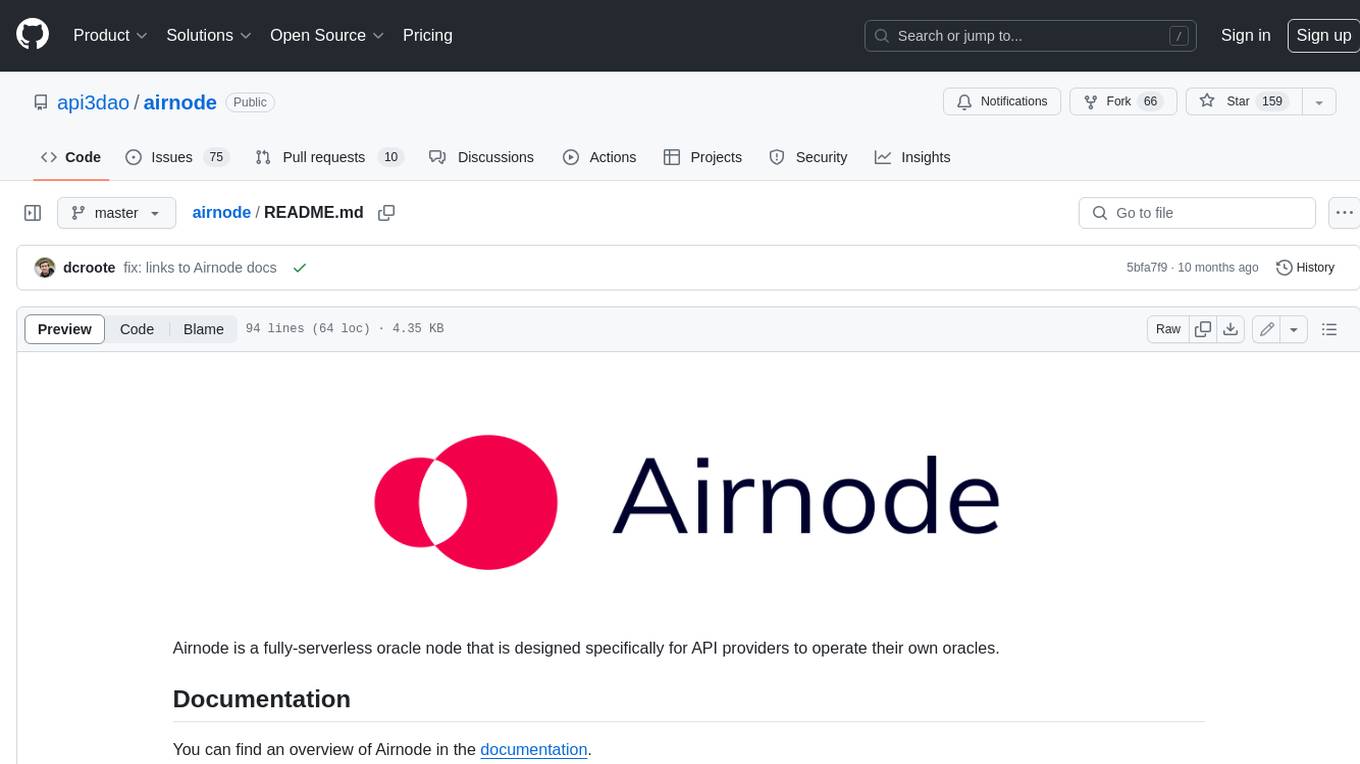
airnode
Airnode is a fully-serverless oracle node that is designed specifically for API providers to operate their own oracles.
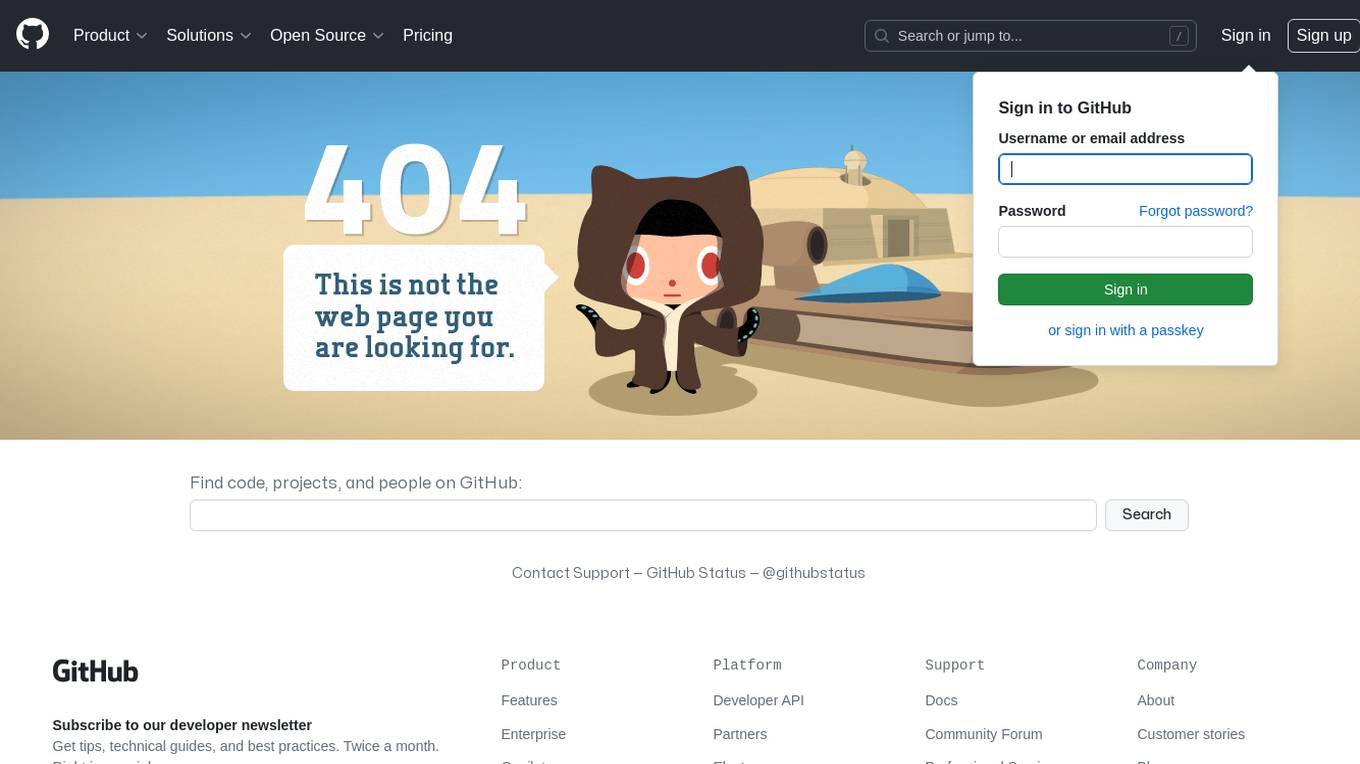
CHATPGT-MEV-BOT
The 𝓜𝓔𝓥-𝓑𝓞𝓣 is a revolutionary tool that empowers users to maximize their ETH earnings through advanced slippage techniques within the Ethereum ecosystem. Its user-centric design, optimized earning mechanism, and comprehensive security measures make it an indispensable tool for traders seeking to enhance their crypto trading strategies. With its current free access, there's no better time to explore the 𝓜𝓔𝓥-𝓑𝓞𝓣's capabilities and witness the transformative impact it can have on your crypto trading journey.

CortexTheseus
CortexTheseus is a full node implementation of the Cortex blockchain, written in C++. It provides a complete set of features for interacting with the Cortex network, including the ability to create and manage accounts, send and receive transactions, and participate in consensus. CortexTheseus is designed to be scalable, secure, and easy to use, making it an ideal choice for developers building applications on the Cortex blockchain.
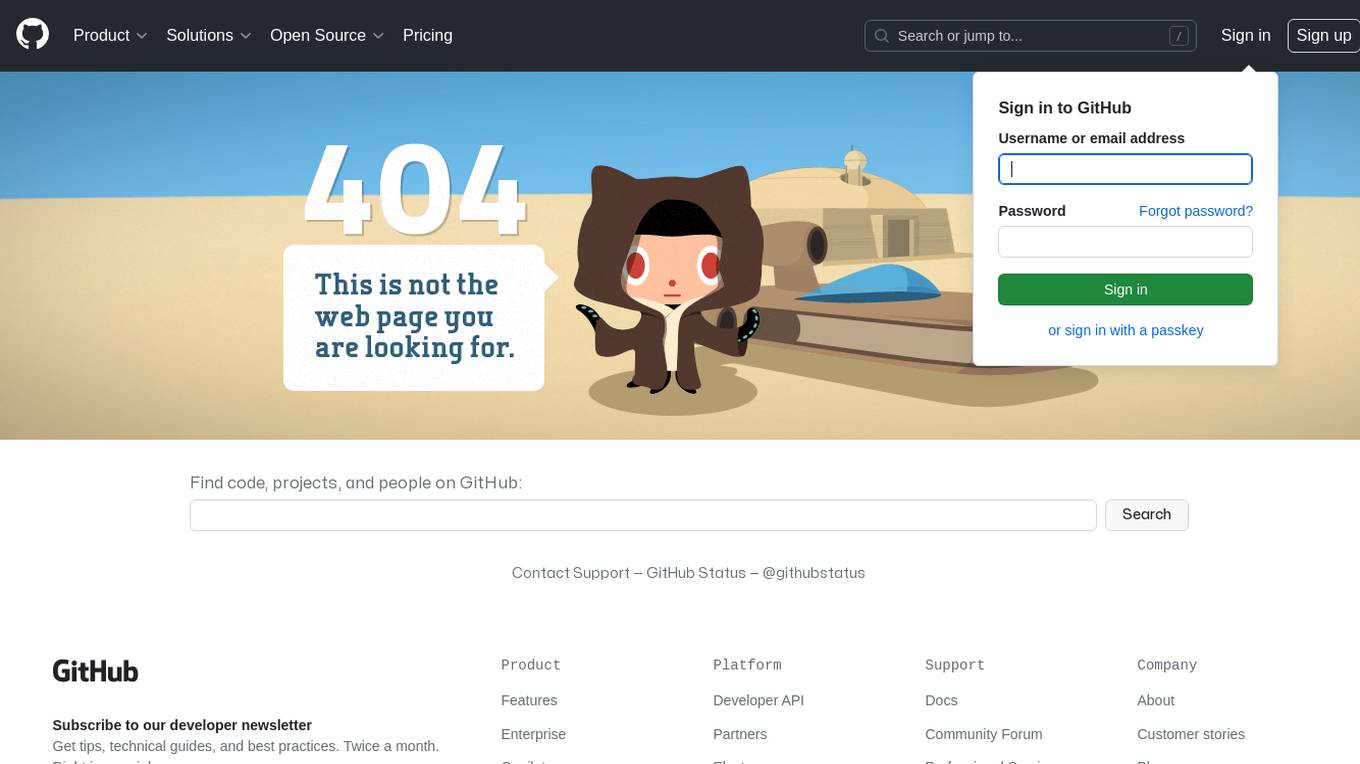
CHATPGT-MEV-BOT-ETH
This tool is a bot that monitors the performance of MEV transactions on the Ethereum blockchain. It provides real-time data on MEV profitability, transaction volume, and network congestion. The bot can be used to identify profitable MEV opportunities and to track the performance of MEV strategies.
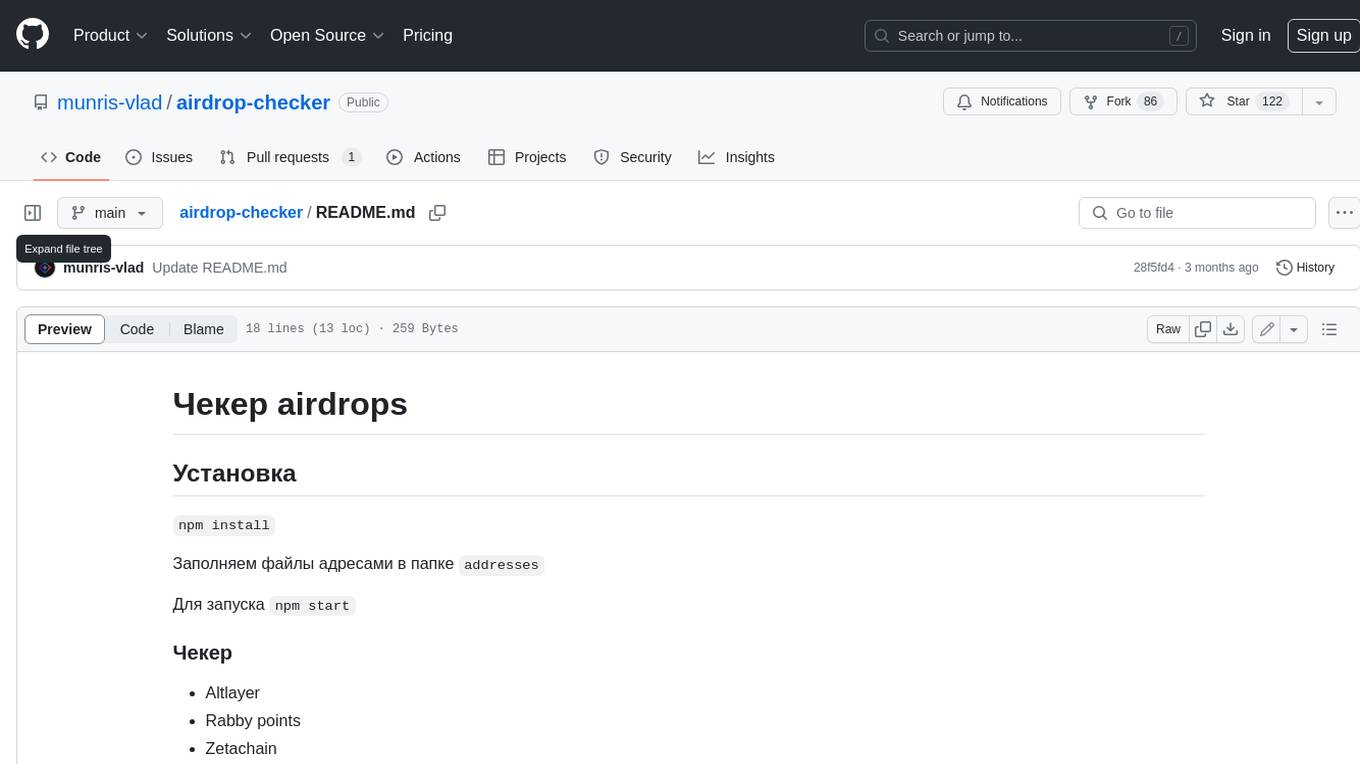
airdrop-checker
Airdrop-checker is a tool that helps you to check if you are eligible for any airdrops. It supports multiple airdrops, including Altlayer, Rabby points, Zetachain, Frame, Anoma, Dymension, and MEME. To use the tool, you need to install it using npm and then fill the addresses files in the addresses folder with your wallet addresses. Once you have done this, you can run the tool using npm start.
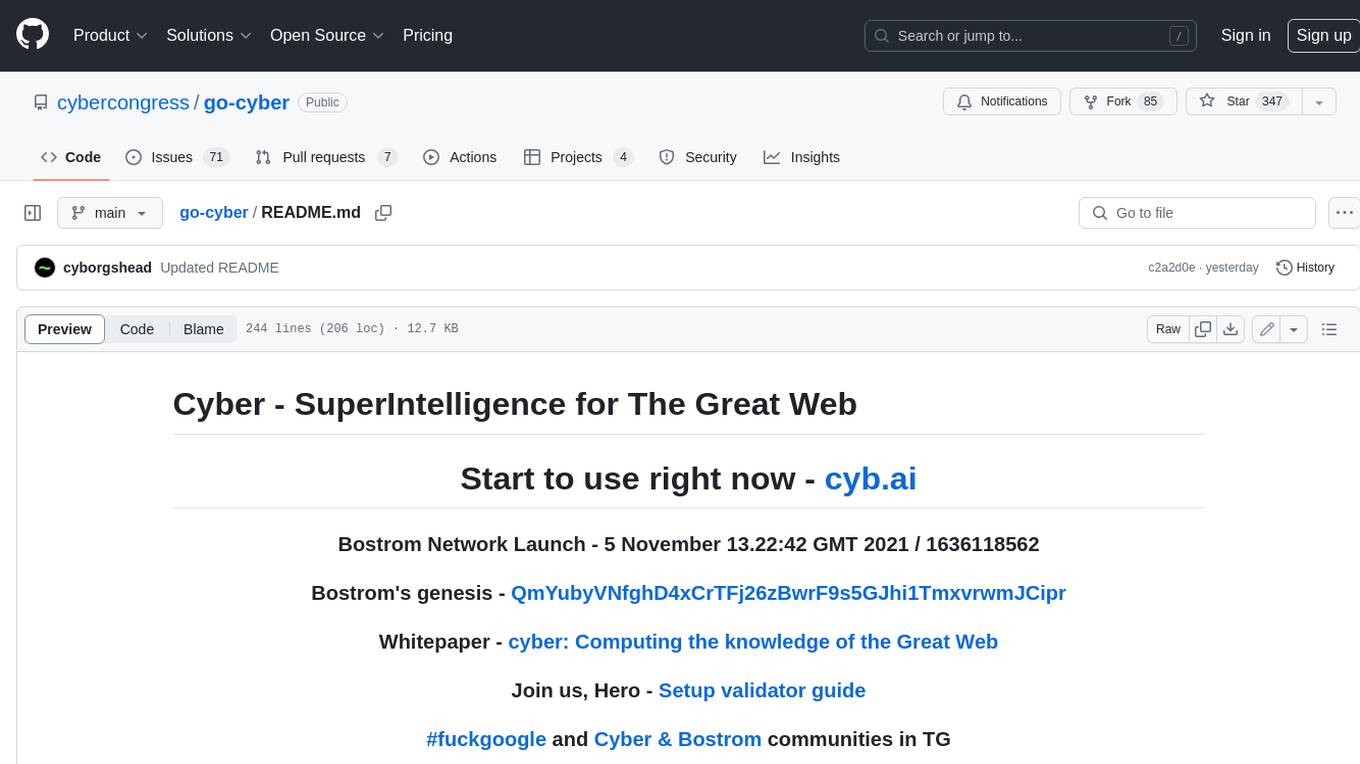
go-cyber
Cyber is a superintelligence protocol that aims to create a decentralized and censorship-resistant internet. It uses a novel consensus mechanism called CometBFT and a knowledge graph to store and process information. Cyber is designed to be scalable, secure, and efficient, and it has the potential to revolutionize the way we interact with the internet.
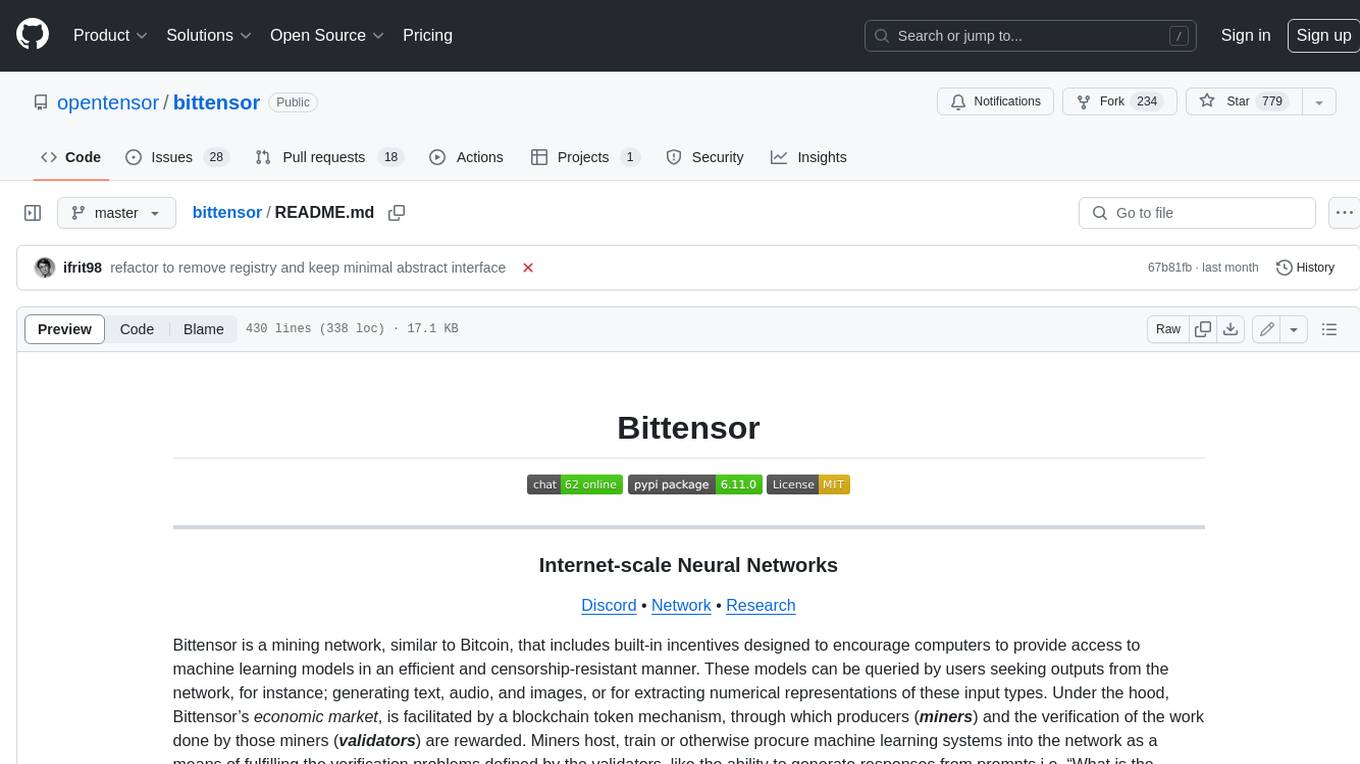
bittensor
Bittensor is an internet-scale neural network that incentivizes computers to provide access to machine learning models in a decentralized and censorship-resistant manner. It operates through a token-based mechanism where miners host, train, and procure machine learning systems to fulfill verification problems defined by validators. The network rewards miners and validators for their contributions, ensuring continuous improvement in knowledge output. Bittensor allows anyone to participate, extract value, and govern the network without centralized control. It supports tasks such as generating text, audio, images, and extracting numerical representations.